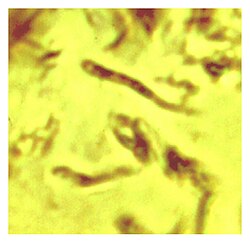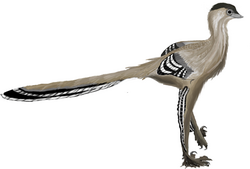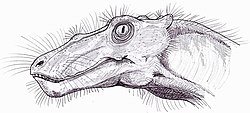| Name | Status | Novelty | Authors | Age | Unit | Location | Notes | Images |
|---|
Aberratiodontus [50] | Valid | Gen et sp. nov. | Gong, Hou & Wang | Early Cretaceous | Jiufotang Formation |  China China
| An Enantiornithes,
Type species A. wui | |
Anserpica kiliani [51] | Valid | Gen et sp. nov. | Cécile Mourer-Chauviré Didier Berthet Marguerite Hugueney | Late Oligocene, Early Miocene | MP 29 |  France France
| An Anseranatidae, the type species of Anserpica Mourer-Chauviré, Berthet & Hugueney, 2004. | |
Bavaripsitta ballmanni [52] | Valid | Gen et sp. nov. | Gerald Mayr Ursula B. Göhlich | Middle Miocene | Mn 6 |  Germany: Germany:
 Bavaria Bavaria
| A Psittacidae, the type species of Bavaripsitta Mayr & Göhlich, 2004. | |
Borvocarbo guilloti [51] | Valid | Gen et sp. nov. | Cécile Mourer-Chauviré Didier Berthet Marguerite Hugueney | Late Oligocene, Early Miocene | MP 30, MN 1 |  France; France;
 Germany Germany
| A Phalacrocoracidae, the type species of Borvocarbo Mourer-Chauviré, Berthet & Hugueney, 2004. | |
? Colymboides metzleri [53] | Valid | Sp. nov. | Gerald Mayr | Early Oligocene | Rupelian |  Germany: Germany:
 Baden-Württemberg; Baden-Württemberg;
 Belgium: Belgium:
 Antwerp Antwerp
| A Gaviidae, not certain a species of Colymboides Milne-Edwards, 1868. | |
Eurotrochilus inexpectatus [54] | Valid | Gen et sp. nov. | Gerald Mayr | Early Oligocene | Rupelian |  Germany: Germany:
 Baden-Württemberg Baden-Württemberg
| A Trochilidae, the type species of Eurotrochilus Mayr, 2004. | |
Iaceornis marshi [55] | Valid | Gen et sp. nov. | Julia A. Clarke | Late Cretaceous | Niobrara Formation |  USA: USA:
 Kansas Kansas
| An Ornithurae, the type species of Iaceornis Clarke, 2004. | |
Longirostravis hani [56] | Valid | Gen et sp. nov. | Hou Lianhai Luis M. Chiappe Zhang Fucheng Chuong Cheng-Ming | Early Cretaceous | Yixian Formation |  China China
| An Enantiornithes, Euenantiornithes, the type species of Longirostravis Hou, Chiappe, Zhang et Chuong, 2004. | |
Meridiocichla salotti [57] | Valid | Gen et sp. nov. | Antoine Louchart | Late Quaternary | Corsica, Crete |  France: France:
 Corsica; Corsica;
 Greece Greece
| A Turdidae, the type species of Meridiocichla Louchart, 2004. | |
Miopica paradoxa [58] | Valid | Gen et sp. nov. | Evgeny N. Kurochkin Denis V. Sobolev | Miocene | Middle Meothis MN 10 |  Ukraine Ukraine
| A Corvidae, the type species of Miopica Kurochkin & Sobolev, 2004. | |
Mirolia brevirostrata [59] | Valid | Gen et sp. nov. | Peter Ballmann | Middle Miocene | MN 6 |  Germany: Germany:
 Bavaria Bavaria
| A Scolopacidae, the type species of Mirolia Ballmann, 2004. | |
Mirolia dubia [59] | Valid | Sp. nov. | Peter Ballmann | Middle Miocene | MN 6 |  Germany: Germany:
 Bavaria Bavaria
| A Scolopacidae. | |
? Mirolia mascalidris [59] | Valid | Sp. nov. | Peter Ballmann | Middle Miocene | MN 6 |  Germany: Germany:
 Bavaria Bavaria
| A Scolopacidae, not certain to belong in Mirolia Ballmann, 2004. | |
Mirolia parvula [59] | Valid | Sp. nov. | Peter Ballmann | Middle Miocene | MN 6 |  Germany: Germany:
 Bavaria Bavaria
| A Scolopacidae. | |
Primobucco frugilegus [60] | Valid | Sp. nov. | Gerald Mayr Cécile Mourer-Chauviré Ilka Weidig | Middle Eocene | Messel pit, MP 11 |  Germany: Germany:
 Hessen Hessen
| A Primobucconidae Feduccia et Martin, 1976. | |
Primobucco perneri [60] | Valid | Sp. nov. | Gerald Mayr Cécile Mourer-Chauviré Ilka Weidig | Middle Eocene | Messel pit MP 11 |  Germany: Germany:
 Hessen Hessen
| A Primobucconidae Feduccia et Martin, 1976. | |
Ramphastosula ramirezi [61] | Valid | Gen et sp. nov. | Marcelo Stucchi Mario Urbina | Early Pliocene | Pisco Formation |  Peru Peru
| A Sulidae, the type species of Ramphastosula Stucchi & Urbina, 2004. | |
Tyto mourerchauvireae [62] | Valid | Sp. nov. | Marco Pavia | Early-Middle Pleistocene | Sicily |  Italy: Italy:
 Sicily Sicily
| A Tytonidae. | |
Vescornis hebeiensis [63] | Valid | Gen et sp. nov. | Zhang Fucheng Per G.P. Ericson Zhou Zhonghe | Early Cretaceous | Yixian Formation |  China China
| An Enentiornithes Walker, 1981, this is the type species of the new genus, most probably a junior synonym of Hebeiornis fengningensis Yan, 1999. | |
Vitirallus watlingi [64] | Valid | Gen et sp. nov. | Trevor H. Worthy | Holocene | Viti Levu |  Fiji Fiji
| A Rallidae, the type species of Vitirallus Worthy, 2004. | |
Wingegyps cartellei [65] | Valid | Gen et sp. nov. | Herculano M. F. de Alvarenga Storrs L. Olson | Late Pleistocene or Early Holocene | Gruta dos Brejões |  Brazil Brazil
| A Cathartidae, the type species of Wingegyps Alvarenga & Olson, 2004. | |



















